|  | |
 |
| Atlanta’s Top Docs | By now I hope you’ve heard the exciting news that Emory physicians are prominently featured in Atlanta magazine’s “Top Doctors” issue again this year. Our stellar team is represented more than any other health system in metro Atlanta in the magazine’s highly competitive annual rankings. This year, 448 physicians representing Emory Healthcare, Emory Healthcare Network, Emory medical staff, or faculty of Emory University School of Medicine made the list—almost 40 percent of the 1,188 top doctors listed in the issue. These outstanding clinicians practice in 425 Emory Healthcare locations throughout metro Atlanta and Georgia.
I’m grateful—but not surprised—to see the talent and hard work of our physicians recognized. Our physician team consistently leads this annual listing, as well as other rankings and awards, because their expertise, innovation, and compassion have earned them the respect and gratitude of their peers and the people they serve.
Thanks to them, local, regional, and national recognition has become the norm for our health system. I’m so proud of our doctors—and of course the superb health care teams they represent—not only for this recognition, but most importantly for the transformative care they provide every day to our patients and their families. Congratulations to you all!
Kind regards,
Ravi
Ravi I. Thadhani, MD, MPH
Executive Vice President for Health Affairs, Emory University
Executive Director, Woodruff Health Sciences Center
Vice Chair, Emory Healthcare Board of Directors
Please direct questions and comments to evphafeedback@emory.edu. | |
| |
| 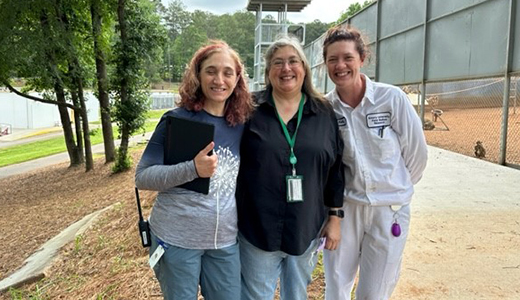 | Our People | The Emory National Primate Research Center (EPC) is the country’s oldest scientific institute dedicated to nonhuman primate research. The groundbreaking studies conducted here help people around the world live longer, healthier lives. I recently had the good fortune to visit the EPC Field Station and meet veterinarians, animal care personnel, and researchers, including Mar Sanchez, Maria Alvarado, and Kelly Bailey (pictured above l – r), three investigators who are using nonhuman primate research to help us understand and treat stress-related and neurodevelopmental disorders, such as anxiety, depression, and autism spectrum disorders.
Mar is a professor in the Department of Psychiatry and Behavioral Sciences with a joint appointment as a core scientist and chief of the Division of Developmental and Cognitive Neuroscience at the EPC. “I came to Emory in 1996 to spend one year as a postdoc,” Mar says, “but I never left. That says a lot about how much I love to do this unique research with these amazing animals, in a top scientific institution and a highly collaborative environment where my lab and colleagues feel like my family.”
Maria, an associate research professor at EPC and a member of the Division of Cognitive and Developmental Neuroscience, agrees. According to Maria, “Our research has implications for animal models of human developmental disorders. One of the benefits of conducting this research at the EPC is the rare opportunity to study individuals from birth to old age within their typical family social structures. In addition to this being a very collaborative division, there is high interest and engagement from the staff, who take as eager an interest in caring for the animals.”
Kelly, a senior research specialist, is a perfect example of that enthusiasm. “The best part of my job is getting to work with these incredible animals every day,” she says. “I get to experience their unique personalities and build close relationships with them while observing their full life cycles. The EPC is unique in that we have a field station where we house our primates in semi-naturalistic environments, giving us a view of their complex social behaviors, which allows us to better understand and apply what we learn to humans.”
EPC Director Paul Johnson recognizes and appreciates the outstanding work of Mar, Maria, and Kelly, saying, “They combine a strong passion for their science with an unwavering commitment to their animals. Their dedication, professionalism, and expertise have helped the Emory National Primate Research Center be recognized as a worldwide leader in behavioral neuroscience in nonhuman primates.”
Thank you, Mar, Maria, and Kelly for helping us improve lives and provide hope!
To nominate a colleague to be featured in an upcoming segment of Our People, please email me at evphafeedback@emory.edu and let me know what makes them special. | |
| |
|  | | Emory Healthcare’s chief transformation officer | Amaka Eneanya has been appointed chief transformation officer for Emory Healthcare. The newly created position will focus on enhancing both patient and clinician experiences at Emory. In that respect, Eneanya will lead the development of systemwide strategies to bolster patient experience. This will include improving patient access, increasing community engagement and outreach, and enriching the overall clinician experience at Emory. She will also prioritize strategies that center around health equity, diversity, and inclusion in the delivery of patient care. Read more.
| | |
| | | 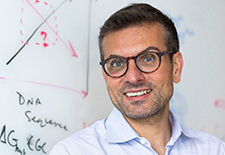 | | Merck Prize for pandemic early alert system | Khalid Salaita, chemistry professor and faculty member of the Wallace H. Coulter Department of Biomedical Engineering, was awarded Merck's 2023 Future Insight Prize for research on a pandemic early alert system. The prize recognizes groundbreaking ideas to solve some of the world’s most pressing challenges in health, nutrition, and energy. The Salaita lab’s sensor, a rolling micro-motor called “Rolosense,” holds the potential to help mitigate, or even prevent, a pandemic. Read more.
| | |
|
| |
| 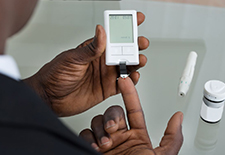 | | Structural racism accelerates diabetes crisis | Structural racism and geographic inequity are advancing the global crisis of diabetes. A narrative literature review recently published in Lancet summarizes the current understanding of diabetes disparities by examining differences between and within race and ethnic groups and among young people aged 18 years and younger. As part of the newly published series, “Global Inequity in Diabetes,” the study also evaluates structural racism’s prominent role in diabetes disparities and offers recommendations to improve equity in diabetes care. Read more.
| | |
| | |  | | Eye contact and brain growth | Researchers at the EPC and Marcus Autism Center recently learned how eye contact with others when we are very young is related to brain growth. This research has the potential to identify early brain and behavioral markers of conditions associated with social disability, such as autism spectrum disorders. In the long term, this work can inform the development of diagnostic tools and timelines for early intervention to better support child and family outcomes. Read more.
| | |
|
| |
| 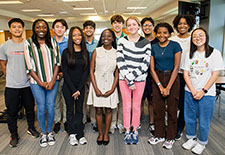 | | Students gain first-hand cancer research experience | Twelve rising high school seniors recently completed a six-week immersion program at Winship Cancer Institute, where they gained experience in clinical, public health, and basic science aspects of cancer research. The Winship Summer Scholars Research Program wrapped up on July 14 with a final symposium in which each student presented a research talk and scientific poster. Read more.
| | |
| | | 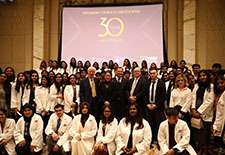 | | Celebrating 30 years of engagement in the country of Georgia | The School of Medicine (SOM) and the Partners for International Development marked the 30-year partnership between Emory University and the country of Georgia by hosting a celebration in Tbilisi this spring. Emory’s engagement with the nation pre-dates the collapse of the Soviet Union, with the earliest memorandum of understanding signed between Emory and the Georgian government in the late 1980s. Read more.
| | |
|
| |
|  | | Using AI to accelerate access to COVID-19 treatment | Researchers at the SOM and Georgia Tech are exploring how artificial intelligence (AI) can increase efficiency of diagnoses and treatment of COVID-19. During the pandemic, the use of telemedicine and electronic health record messaging rapidly increased, which sometimes created digital logjams that could slow response and delay access to timely treatment. A new study published in JAMA Open Network assessed how a specific type of AI called natural language processing can speed up the time between a patient-initiated message, a physician response, and access to COVID-19 antiviral treatment. Read more.
| | |
| | |  | | Free public health course on abortion | Despite major gains in sexual and reproductive health and gender equity worldwide, abortion remains a topic rife with misinformation, disinformation, and the influence of policies not based in science or health. Coming soon, the Rollins School of Public Health (RSPH) will launch the first massive open online course of its kind: Public Health Approaches to Abortion. The course, which will be offered for free, aims to provide a general audience with accessible and foundational knowledge on the topic of abortion that will be open to everyone within the Emory community and beyond. Read more.
| | |
|
| |
| 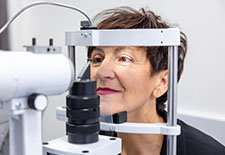 | | Advancing research on age-related macular degeneration | A team of researchers in the Wallace H. Coulter Department of Biomedical Engineering, the SOM, and the Cole Eye Institute at the Cleveland Clinic have developed a new method to detect geographic atrophy—the most advanced stage of dry-age macular degeneration (AMD) that affects more than 8 million people worldwide. The findings were recently published in the journal IEEE Transactions in Biomedical Engineering. Read more.
| | |
| | |  | | Peer recovery coaching support for individuals with substance use disorders | In light of the ongoing opioid epidemic, Emory researchers are testing a new support service for those with substance use disorders who visit Grady Memorial Hospital’s emergency department. Through a grant from the Centers for Disease Control and Prevention, a new peer recovery coaching program will be offered to patients with substance use disorder-related conditions to learn more about recovery resources following treatment. Read more.
| | |
|
| |
| 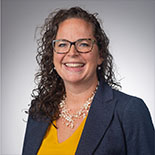 | | SOM Center for Holistic Student Success | The SOM is launching a new Center for Holistic Student Success dedicated to improving students’ energy preservation through structures, systems, and supports that enhance learning and development. Led by Christen Hairston, associate dean of student success, the center is an important step toward creating an environment that optimizes the balance of health science students’ mind, body, and spirit.
| | |
| | | 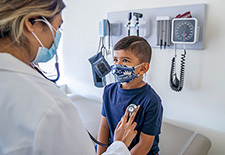 | | Later cardiac complications from pediatric radiation therapy | A study reported in the Journal of Clinical Oncology and led by Winship researcher and radiation oncologist James Edward Bates demonstrates for the first time that applying the same radiation therapy dose to the heart’s substructures as a uniform dose to the whole heart in children with cancer puts them at higher risk for future heart complications. Read more.
| | |
|
| |
|  | | Risk of venomous snakebites grows as temperatures increase | There is a significant jump in the likelihood of being bitten by a snake for every degree Celsius that daily temperatures increase, according to a study published in GeoHealth. “As a research group, we are regularly investigating how weather and climate affect human health,” said Noah Scovronick, RSPH assistant professor of environmental health and lead author of the study. “And snakebite is a health issue that really causes a surprisingly large health burden globally and one that is very well known to be understudied.” Read more.
| | |
| | | 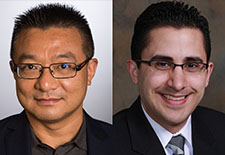 | | Using data to predict atrial fibrillation | Xiao Hu, Asa Griggs Candler Professor at the Nell Hodgson Woodruff School of Nursing (SON), and Fadi Nahab, stroke quality director at Emory Healthcare (pictured above l-r) are leading a study on the use of data strategies to detect and predict atrial fibrillation in post-stroke patients. Atrial fibrillation is the most common form of arrhythmia (irregular heartbeat), affecting 33.5 million people globally. Atrial fibrillation is associated with significant morbidity and mortality, including 20 percent of all strokes. Read more.
| | |
|
| |
| | 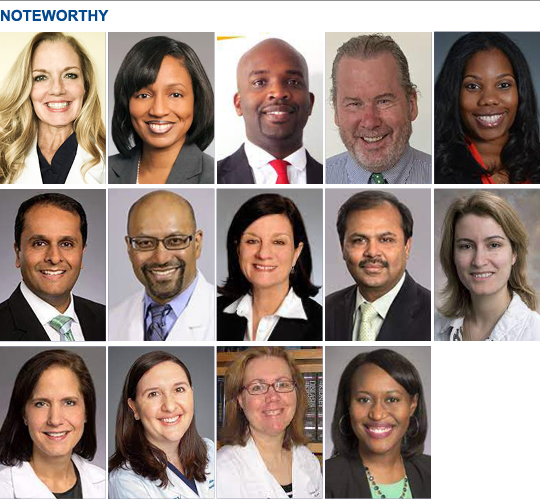 | | Jennifer Adamski, associate professor and program director of the adult-gerontology acute care nurse practitioner program at the SON, is the president-elect of the American Association of Critical-Care Nurses. Read more.
Jada Bussey-Jones, associate dean of professional development of Emory at Grady Memorial Hospital and the chief of general medicine and geriatrics for Emory at Grady, has been named president of the Society of General Internal Medicine.
Jason Cobb, associate professor of medicine, was honored with the Distinguished Leader Award as part of the American Society of Nephrology's Lifetime and Midcareer 2023 awards.
Michael Huerkamp, director of the Division of Animal Resources, was awarded the Nathan R. Brewer Lifetime Achievement Award from the American Association of Laboratory Animal Sciences.
Dayna Johnson, RSPH assistant professor of epidemiology, is the recipient of the 2023 Diversity, Equity and Inclusion Leadership Award from the Associated Professional Sleep Societies.
Shishir K. Maithel, Winship surgical oncologist, has been named editor-in-chief of Surgical Oncology Insight, the newly launched official open access journal of the Society of Surgical Oncology.
Noble Maleque, associate program director for the J. Willis Hurst Internal Medicine Residency Program, received the Faith T. Fitzgerald Award for Outstanding Educator of Residents and Fellows from the American College of Physicians.
Molly Perkins, association professor in the Department of Medicine’s Division of Geriatrics and Gerontology, received the 2023 Gordon Streib Distinguished Academic Gerontologist Award.
Suresh S. Ramalingam, executive director of Winship, was elected to the Association of American Physicians.
Nadine Rouphael, executive director of the Hope Clinic and the Emory principal investigator for the NIH-funded Vaccine Treatment and Evaluation Unit, was named Investigator of the Year during the inaugural Infectious Diseases Clinical Research Consortium Annual Awards.
Maria C. Russell, surgical oncologist, has been named chief quality officer for Winship Cancer Institute. Read more.
Sara Turbow, associate professor in the Department of Medicine, is the 2023 recipient of the Association for Prevention Teaching and Research Early Career Award.
Susan M. Wall, professor of medicine, was honored by the American Physiological Society with the 2023 Robert W. Berliner Award for Excellence in Renal Physiology Award.
Zanthia Wilely, assistant professor of infectious diseases in the Department of Medicine, is the president-elect of the American Federation for Medical Research. | |
| |
| | August 12 | Emory Sports Medicine Center Women’s Sports & Wellness Conference. The SOM, 100 Woodruff Circle NE. 8 am – 4 pm. Register to attend in person here. Register to attend virtually here. Learn more about the event here.
| | |
| | | | August 17 | Bioentrepreneurship Networking. Emory bio-entrepreneur James Dahlman will share his success story. Food will be provided. R. Randall Rollins, 2nd floor, Room R226, 4:30 - 6:30 pm. RSVP here.
| | |
|
| |
|

